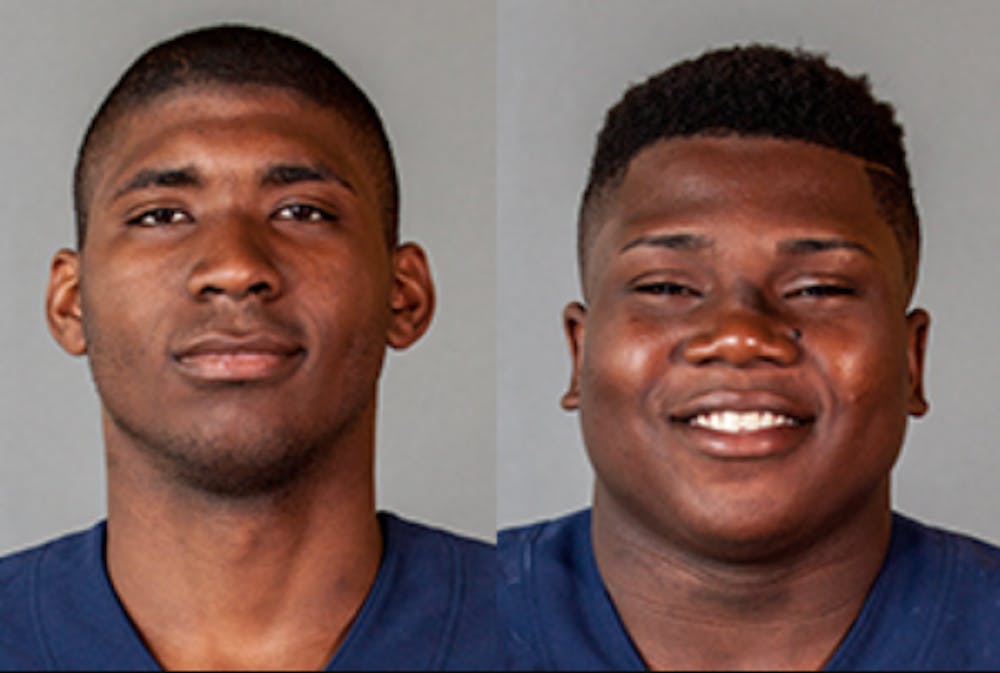It was not until “The Star-Spangled Banner” began to play that Ian Blow ’19 decided to take a knee. Of course, he had thought about it before — a lot, ever since Colin Kaepernick first did so in August of last year.
After almost kneeling at the Middlebury football team’s Oct. 7 game at Amherst, Blow, who is black, planned to protest the following week. Before doing so, he wanted first to share his plan with his teammates. However, in the midst of a hectic, midterm-filled week leading up to their Oct. 14 game against Williams, the chance to open up a conversation never came. As he sat in the locker room prior to kickoff, Blow, a defensive end, decided to wait another week.
“I didn’t go through the steps beforehand to be respectful of my teammates, so I decided I wasn’t going to take a knee,” Blow said in an interview with The Campus.
But as he stood on the sideline just before kickoff and the national anthem came over the loudspeakers, something changed. Blow caught sight of a banner promoting Green Dot, a program that trains members of the community in bystander intervention to help prevent instances of power-based personal violence. That day, Blow and his teammates were wearing green dots on their helmets to show support for the program. He said Green Dot has been incredibly important to him and, in that moment, the banner served as a reminder of the need to take action.
“In that situation, I thought, ‘nobody is a bystander,’ ” he said. “You are either part of the solution, or you’re not. I saw that Green Dot banner and I thought, ‘I have the option here to either be part of the solution today, or not be part of the solution today.’”
After that realization, he got down on one knee, ignored his surroundings, and focused his eyes on the woman singing the anthem.
“Going in, my focus was on playing and winning the game, but for that moment I was also making that stand and I wasn’t worried in that moment," he said. "I was sure of what I was doing as I did it.”
Blow was then joined by one of the team’s running backs, Diego Meritus ’19, who is also black. The two had been linking arms during the anthem throughout the season, and had previously discussed the possibility of taking a knee.
Meritus did not respond to an interview request.
As the two players knelt on the sidelines, first-year running back Charlie Ferguson ’21 stood beside Blow and placed a hand on his teammate’s shoulder.
“Diego and Ian are standout guys. I have a great amount of respect for them both,” Ferguson said. “When they took a knee I fully supported the statement they were making and wanted to show my support. In the moment I figured the best way for me to do this was [by putting] my hand on their shoulder.”
From there, they took to the field and focused on football. After the game, Blow and Meritus discussed their decision with coach Bob Ritter, who, according to Blow, supported their right to express themselves in this way, but wished they had let him know prior to kick-off.
“I definitely agree with him there. The best way to have gone about it would have been to have a conversation first and then done the protest,” Blow said. “I didn’t apologize for kneeling. I admitted that I could have done it in a better way, but I did what I thought was right.”
“I respect their decision to kneel during the national anthem,” Coach Ritter told The Campus. “They wanted to make a statement about race and inequality, and they made it clear to their coaches and teammates that they weren’t protesting the military, our country, or the national anthem.”
According to Blow, his teammates were understanding of his and Meritus’ decision, and even those who disagreed did so in a way that did not tarnish friendships, or affect the team. Ritter agreed.
“We have always tried to foster an atmosphere of respect and inclusivity on our team. Although some of our players expressed various viewpoints on this subject, our discussions were thoughtful and respectful, and our players were supportive of each other,” he said.
Earlier in the year, during the team’s preseason, the coaching staff asked the players to gather in small groups and answer the question, “What do you think of when you listen to the national anthem?” Blow used that time to reflect.
“I feel incredibly proud to be a part of a nation that gives us so many opportunities and freedoms that we take for granted every single day. At the same time, I acknowledge that we also live in a flawed nation, where there is a lot of injustice,” Blow said. “And that’s why I felt sure I was doing the right thing because that’s what I think every time I hear the anthem. And I feel like taking a knee is part of that progress towards a better United States.”
Blow emphasized his deep respect for members of the military, and that his decision to protest is meant to highlight systemic, racial injustice, not disrespect those who serve.
For the rest of the season, Blow and Meritus continued to protest. The following week, they played and protested at Bates without incident. However, the following week, at an Oct. 28 home game against Trinity, someone in the stands began heckling Blow and Meritus, telling them to stand up and respect the flag. The tirade ended with the man using a racial slur.
“He yelled, ‘n–gger.’ Initially, when he started heckling, I was a little flustered,” Blow said. “But as soon as he said, ‘n–gger,’ I was immediately sure of what I was doing.”
For Blow, the incident showcased the kind of bigotry that he and others who protest are trying to expose.
“Racial hatred and discrimination [exist]. And it’s in our community,” he said. “That’s what taking a knee is all about — facilitating a discussion and making you see that there is a racial undertone to our politics and our policing that negatively affects black people.”
The team’s final game against Tufts took place on Nov. 11, Veterans Day. As he prepared for the game, Blow grappled with how to protest in a way that could not be perceived as disrespecting those who served. After researching how to properly salute a member of the military, he came up with his plan. On game-day, as the national anthem played, Blow did not face the flag, opting instead to stand and salute a member of the military who was in attendance.
Blow said he does not tend to seek the spotlight, which is why he waited more than a month to talk on the record for this article. But he is interested in engaging in conversations with members of the Middlebury community about issues related to race.
His and Meritus’ decision to protest comes at a time when issues of race have dominated not only national discussions, but also those on campus. Events like a student’s alleged incident of racial profiling, racially charged vandalism and the aftermath of the student-led protests of Charles Murray have sparked campus-wide conversations about race and class, and systemic problems that many feel the college has failed to address.
“I see problems happen on campus and I look at them through a societal lens,” he said. “I see things happen and I’m not upset with Middlebury or the Middlebury community, I’m just recognizing even more that there are problems in our society that we have to deal with.”
“In a way, me kneeling for those societal issues, is me kneeling for those problems we face at Middlebury,” he said.




